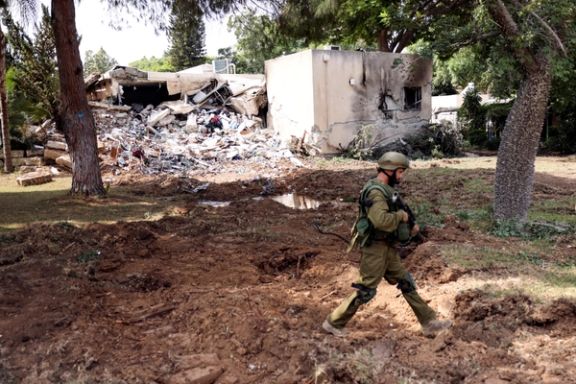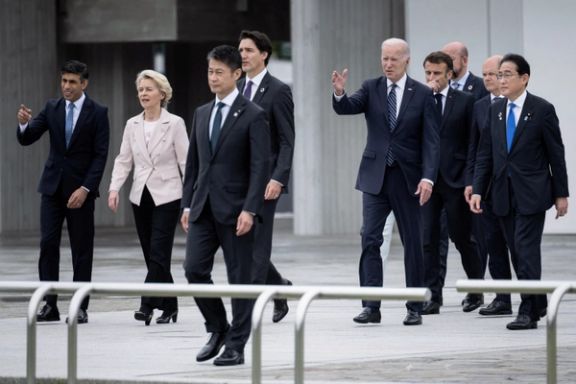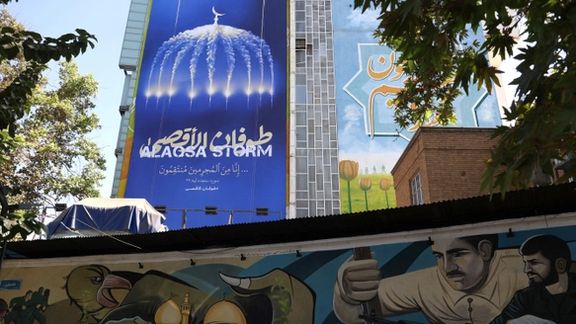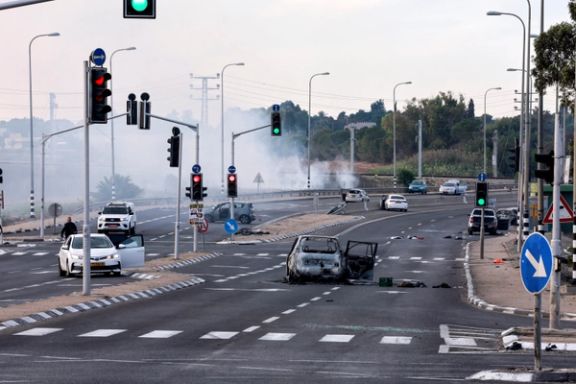Israel Poised To Start Ground Offensive Amid Escalating Conflict With Hamas

Israel has announced its intention to escalate its response following the recent terror attack by Hamas, even preparing for the possibility of a ground offensive.

Israel has announced its intention to escalate its response following the recent terror attack by Hamas, even preparing for the possibility of a ground offensive.
In sustained air strikes, Israel targeted more than 200 locations within a Gaza City neighborhood that Hamas had reportedly been using as launch sites for their attacks. The Gaza health ministry reported at least 950 fatalities and 5,000 injuries in the densely populated enclave.
Hamas invasion of southern Israel on October 7 has resulted in over 1,200 Israeli casualties, primarily among civilians. Some individuals were taken hostage and paraded through Gaza's streets. Hamas issued threats to execute Israeli captives in response to each Gaza home struck, but it remained uncertain if these threats were carried out.
Meanwhile, Israeli Defense Minister Yoav Gallant made a commitment to bring "significant changes to Gaza," hinting at the possibility of a ground offensive. Report say that more than 1,000 gunmen from Gaza were killed.
Reports also emerged of rocket fire originating from Lebanon and Syrian territory towards Israel, raising concerns about the conflict's potential expansion. Israeli forces responded with retaliatory actions.
"We do not yet know if these rockets were fired by the Syrian armed forces, by any of the many Iranian militias that exist and are welcomed by the Syrian regime, or Hezbollah or any other action," said Israel's Lieutenant Colonel Conricus.
"What we do know is that we retaliated fire toward the sources of fire, and currently the situation there is quiet."
With the escalating violence, numerous countries undertook efforts to evacuate their stranded citizens due to flight cancellations.
The conflict also spilled over into the West Bank and East Jerusalem, leading to casualties and injuries among Palestinians involved in clashes with Israeli forces.

The wording of a joint statement of world leaders condemning Hamas's war against Israel, has mysteriously removed mention of Iran.
According to copies of documents obtained by Iran International, in the first drafts of the press release from the leaders of France, Germany, Italy, the United Kingdom and the US, it had clearly sent a message to Iran to stay out of the fray.
It stated: “Our countries will support Israel in its efforts to defend itself and its people against such atrocities. We further call on other extremist groups, and any state that may seek to take advantage of such a situation, and in particular Iran, not to seek to exploit this situation for other ends, or to spread the conflict beyond Gaza.”
However, just hours later, when the final statements went out from President Macron of France, Chancellor Scholz of Germany, Prime Minister Meloni of Italy, Prime Minister Sunak of the United Kingdom, and President Biden of the United States, the reference to the Iranian regime had disappeared.
It comes as fingers are pointing at Iran for Hamas’s surprise attack on Israel on Saturday morning which since it began, has seen over 1,200 Israelis dead, more than 2,000 seriously wounded, and dozens taken hostage to Gaza.
As the days go by, more revelations expose the brutality of the assault which has seen babies beheaded, elderly women taken hostage, and young women raped and burnt alive in the streets. Retaliation from Israel has seen Gaza slowly razed, key members of the terror network assassinated and huge swathes of the enclave crushed. Hundreds have already died.
While there is no conclusive evidence as to the involvement of Iran in the worst offensive against the Jewish state in 50 years, Hamas is its biggest Palestinian proxy, receiving at least $100m a year in addition to military support and training. High level leaders of Iran’s Palestinian proxies have also had multiple meetings in recent weeks orchestrated and hosted by Tehran.
The latest statement of the world leaders instead read on Tuesday: “Our countries will support Israel in its efforts to defend itself and its people against such atrocities. We further emphasise that this is not a moment for any party hostile to Israel to exploit these attacks to seek advantage.”
The US has moved aircraft carriers into the Mediterranean as a clear deterrent to Iran not to escalate matters, from its proxies in Syria and Lebanon or its own soil.
While Iran’s Supreme Leader and President led the charge to sing out praise for the Hamas operation, General Charles Q. Brown, the chairman of the US Joint Chiefs of Staff, said its moving support into the region was a clear warning to other countries, namely Iran’s proxies, ”not to get involved."
"We want to send a pretty strong message. We do not want this to broaden, and the idea is for Iran to get that message loud and clear," Brown said on Monday, naming Iran in no uncertain terms.
The group of world leaders in the latest show of support released on Tuesday, expressed its “unequivocal condemnation of Hamas and its appalling acts of terrorism”, adding that its actions have “no justification, no legitimacy, and must be universally condemned”, contrary to the regime rhetoric that Israel’s “occupation” has led to the current situation.
“In recent days, the world has watched in horror as Hamas terrorists massacred families in their homes, slaughtered over 200 young people enjoying a music festival, and kidnapped elderly women, children, and entire families, who are now being held as hostages,” the group said, while recognising what it called “the legitimate aspirations of the Palestinian people”.
“But make no mistake: Hamas does not represent those aspirations, and it offers nothing for the Palestinian people other than more terror and bloodshed,” it added.
On Wednesday, missiles were fired once again into Israel from Lebanon, the IDF responded with artillery fire. While Hezbollah continues to claim responsibility, the IDF Tuesday morning claimed the group responsible for the hostilities of recent days was Palestinian Islamic Jihad, also backed by Tehran.

Fresh clashes between Israel and the Iran-backed Lebanese Hezbollah along the shared border on Wednesday signified the danger of a widening war in the region.
Israeli shelling hit southern Lebanese towns in response to a fresh rocket attack by powerful armed group Hezbollah, as cross-border violence extended into a fourth day.
Hezbollah said it had fired precision missiles at an Israeli position in response to the killing of its members in Israeli shelling earlier this week, pledging "decisive" responses to attacks on Lebanese territory, especially deadly ones.
The Israeli military said it was attacking Lebanon after one of its northern positions near the Israeli town of Arab al-Aramshe was targeted with anti-tank fire on Wednesday.
It did not immediately provide details on casualties.
A Lebanese security source said Hezbollah fired two precision missiles into Israel, which the group considers its sworn enemy.
Residents of the southern Lebanese town of Rmeish said Israeli shelling hit nearby. A security source told Reuters that Israeli artillery rounds were hitting the rocket launch point around Dhayra, across from Arab al-Aramshe.
Local Lebanese television station al-Jadeed broadcast images of plumes of white smoke billowing out of a wooded region near some homes and farmland in Dhayra.
Hezbollah and Palestinian faction Hamas both claimed attacks from Lebanon on Tuesday. Lebanon's Hezbollah fired a guided missile at an Israeli tank, posting a video of its destruction, and Hamas said it launched a salvo of rockets into Israel.
The outbreak of violence along the border came after Hamas launched a deadly attack against Israel at the weekend, with Israel unleashing a bombing campaign against Gaza.

The US considers Iran ‘at least complicit’ in Hamas attack on Israel, the State Department said Tuesday, after insisting it had no evidence of Tehran's direct involvement.
Spokesperson Matthew Miller told reporters the Biden administration is now trying to establish if the regime in Iran or elements within the system contributed to the planning of the attack by Hamas militants.
“Iran likely knew that Hamas was planning operations against Israel, but without the precise timing or scope of what occurred,” Miller told journalists at the State Department’s press briefing.
The Islamic Republic has been supporting Hamas for many years. It’s not yet established, however, how far the IRGC was involved in Hamas’ most recent operation.
Ghazi Hamad, a Hamas spokesman, told the BBC that the group had direct backing for the attack on Israel from Iran. A report in Wall Street Journal suggested the same, quoting unnamed sources from Hamas and Hezbollah.
Iran has denied involvement in the operation, which has killed more than 1,200 Israelis. “They say the Islamic Iran was behind this move… they are wrong… Palestinians did it themselves,” said Supreme Leader Ali Khamanei Tuesday.
On numerous occasions before, he has boasted that his regime has had a hand in confrontations against Israel (like the 33-day War with Hezbollah in 2006) and that Iran will keep on helping “any group that fights the Zionist regime.”
The extent of the regime’s involvement in the Hamas attack, if and when it’s established, would likely inform the nature of the response from Israel and the United States. Many in Washington are already pushing for retaliatory measures, including re-freezing the $6 billion of Iran’s old revenue that was unblocked last month to secure the release of five Iranian-Americans held hostage in Tehran.
US Senators have written to President Biden, demanding that access to the money (currently held in a Qatari bank) be denied.
“The State Department should immediately rescind the waivers that allowed Iranian funds converted and moved to more accessible bank accounts,” reads the lawmakers’ letter to Biden, “as well as work with US ally Qatar to immediately freeze the accounts containing these funds.”
The signatories believe that the $6 billion, even if used solely and entirely for humanitarian purposes, would free up other funds in Iran to be used on other, ‘malign’ activities.
Responding to this argument, the State Department Spokesperson said he could confirm that “not a cent” of the $6 billion has been spent at this point. “And we have the ability to freeze it at any time,” Miller concluded.
Hamas’ attack on Israel has enraged those who believe they had warned the Biden administration of the consequences of its lenient approach to the regime in Iran.
“Concessions to the ayatollahs have made them believe America will not stand up for itself or our allies,” Senator Tom Cotton told Fox News Tuesday, “President Biden must reverse his policies that have emboldened Iran and its terrorist proxies.”
It seems to be an attack line the Republicans would not abandon soon.
“Make no mistake— Hamas's genocidal violence was partly enabled by Biden unfreezing billions of dollars to Iran,” Senator Ted Cruz said Tuesday.
Tim Scott, another Republican Senator who is a ranking member of the Senate Committee on Banking, called for a hearing and an investigation into the ‘release of the $6 billion to Iran’.
“We should be signaling strength - not leniency - when it comes to Iran,” Senator Scott said in a statement Tuesday, “that’s why now is the time to pass my Solidify Iran Sanctions Act and send the message that Iran should not expect U.S. sanctions to lapse.”

Two of Iran’s heavily armed proxy groups in the region have threatened to target US interests if Washington intervenes to support Israel in its conflict with Hamas.
The Houthi Movement in Yemen and a powerful Iraqi militia group both issued identical statements, which can be a sign that Tehran is willing to leverage its loyal proxies to flex its muscle against the United States.
The comments come amid strong support by the United States for Israel's response to the attacks and a US pledge to rapidly provide additional munitions to Israel and deploy a carrier strike group to the Eastern Mediterranean.
In Yemen, the leader of the powerful Houthi Movement warned on Tuesday that the group would respond to any US intervention in Gaza with drones, missiles and other military options.
He said the group was ready to coordinate intervention with other members of the so-called "Axis of Resistance" which encompasses Iranian-backed Shiite Muslim factions in Iraq and Lebanon's Hezbollah group, which has already entered the fray.
The remarks came after the top US general late Monday warned Iran not to get involved in the crisis in Israel and said he did not want the conflict to the broaden, as Lebanese Hezbollah fired rockets onto northern Israel.
The White House earlier on Monday said that Iran was complicit even though the United States has no intelligence or evidence that points to Iran's direct participation in attacks in Israel by Palestinian Islamist group Hamas.
Asked what his message for Iran was, General Charles Q. Brown, the chairman of the Joint Chiefs of Staff, said: "Not to get involved."
Later on Tuesday, President Joe Biden repeated the warning in an address to the nation. "So, in this moment, we must be crystal clear. We stand with Israel. Let me say again to any country, any organization, anyone thinking of taking advantage of this situation, I have one word. Don't. Don't!"
In Iraq, Hadi Al-Amiri, a powerful Iraqi politician close to Iran and a key figure in the cross-party alliance backing the Baghdad government, also threatened to target American assets, in comments made during a tribal gathering in the capital.
"If they intervene, we will intervene...If the Americans intervened openly in this conflict..., we will consider all American targets legitimate..., and we will not hesitate to target it," Al-Amiri said on Monday.
He leads the Badr Organization, a Shi’ite political group supported by Iran that comprises a large part of Iraq's Popular Mobilization Forces (PMF), the state paramilitary organization that contains many Iran-backed factions.
If the US forces intervene in the operation al-Aqsa Storm – the codename for the Hamas attack, “we will target the American bases” as well as Israeli positions, said Abu Hussein al-Hamidawi, the secretary-general of Kataib Hezbollah, a radical Iraqi Shiite paramilitary group and part of the PMF.
The PMF has voiced its "unequivocal support" for the Palestinian factions fighting Israel and the Iraqi government has said the Palestinian operations were a natural outcome of what it calls "oppressive" policies by Israel.
In past years, Iranian-backed militias in Iraq regularly targeted US forces in Iraq and the US embassy in Baghdad with rockets, though such attacks have abated under a truce in place since last year, as Iraq enjoys a period of relative calm.
The United States currently has 2,500 troops in Iraq - and an additional 900 in Syria - on a mission to advise and assist local forces in combating Islamic State, who in 2014 seized swathes of territory in both countries.

A senior Hamas official said if Gaza were subjected to “a war of annihilation,” allies such as Iran and Lebanese Hezbollah "would join the battle."
Ali Barakeh, a member of Hamas' exiled leadership, shared the remarks during an interview with The Associated Press at his office in Beirut.
The statement was made amid Israel's bombardment of Gaza and its declaration of a complete blockade of the Hamas-controlled territory following a surprise attack Saturday that caught Israel's military and intelligence services completely off guard. It has resulted in the worst military bombardment of the Jewish state in 50 years.
Hundreds of Hamas militants entered by land, sea and air, resulting in the massacre of hundreds of soldiers and civilians, with dozens more taken captive, including women, children and the infirm.
Barakeh claimed that the attack had been planned by approximately six senior Hamas commanders in Gaza and that even their closest allies were unaware of the timing beforehand.
He refuted reports suggesting that Iranian security officials had helped orchestrate the attack or had given approval during a meeting in Beirut the previous week.
The development came after a joint statement issued on Monday by the United States and four European allies, where they reaffirmed their support for Israel. The leaders of the United States, France, Germany, Italy, and Britain emphasized their solidarity with Israel while condemning Hamas.
“We make clear that the terrorist actions of Hamas have no justification, no legitimacy, and must be universally condemned. There is never any justification for terrorism,” read the statement.